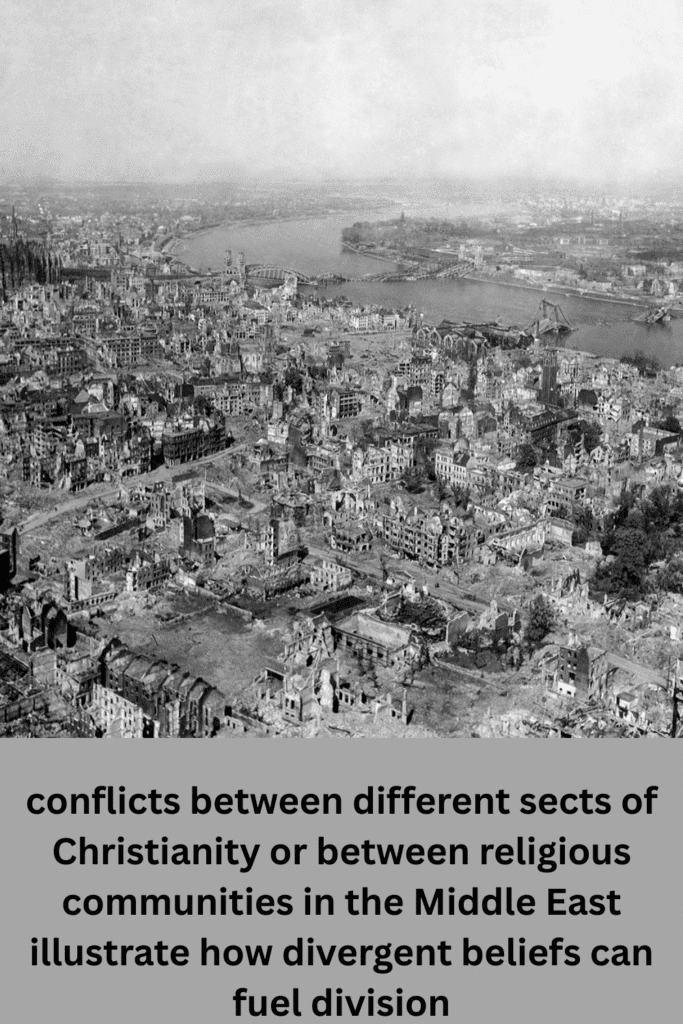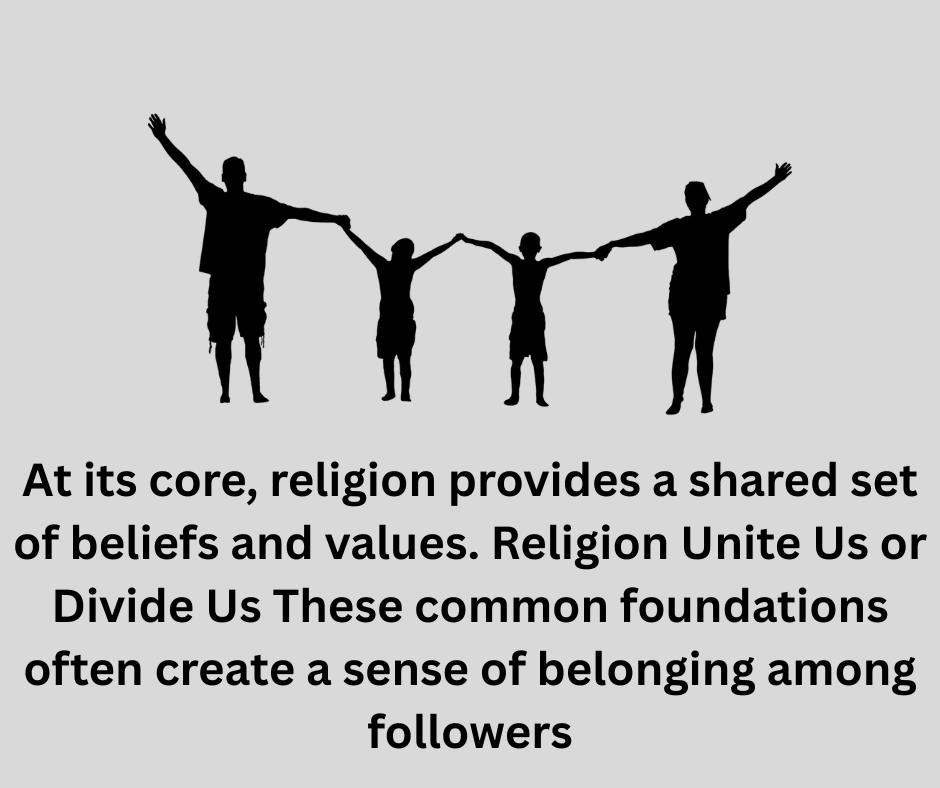Religion Unite Us or Divide Us ,Religion has been a fundamental part of human history for thousands of years. Across continents and cultures, religion has shaped societies, inspired art, and provided meaning to billions of lives. Yet, the question remains: Does religion unite us or divide us?
The answer is not simple. Religion can be a powerful force for both unity and division, depending on how it is understood, practiced, and interpreted. This article explores the complex role religion plays in human society — how it brings people together, how it separates them, and what this means for the future of our global community.

Table of Contents
How Religion Unites Us
1. Shared Beliefs and Values
At its core, religion provides a shared set of beliefs and values. Religion Unite Us or Divide Us These common foundations often create a sense of belonging among followers. For many, religion answers life’s biggest questions:
- Why are we here?
- What is our purpose?
- How should we live?
By offering guidance on morality, ethics, and life purpose, religion helps people find common ground. This shared worldview can foster trust, cooperation, and community.
2. Community and Social Bonds
Religious institutions such as churches, mosques, temples, and synagogues are more than places of worship — they are centers of community life. People come together to:
- Celebrate festivals and rituals
- Support one another in times of joy and grief
- Volunteer and help the needy
Through these activities, religion builds strong social networks that promote solidarity, mutual aid, and emotional support.
3. Promoting Compassion and Forgiveness
Religion Unite Us or Divide Us Many religions teach the importance of compassion, forgiveness, and love. These principles encourage followers to treat others with kindness, care for the vulnerable, and resolve conflicts peacefully.
For example:
- Christianity emphasizes “love your neighbor.”
- Buddhism teaches compassion for all living beings.
- Islam stresses charity and mercy.
By inspiring ethical behavior, religion can foster harmony and understanding among diverse groups.
4. Creating Identity and Purpose
Religion gives people a strong sense of belonging and a reason to be, tying individuals and communities to their heritage, customs, and roots. Religion Unite Us or Divide Us,This shared connection fosters unity among families, ethnic groups, and nations, bridging their everyday differences.
How Religion Divides Us
1. Doctrinal Differences and Exclusivity
One major source of division is the fact that religions often make exclusive truth claims. Many religions believe that their path is the one true way, which can lead to intolerance of other faiths.
This exclusivity sometimes creates:
- Rivalries between religious groups
- Religious discrimination or persecution
- Social fragmentation along religious lines
Religion Unite Us or Divide Us, For example, conflicts between different sects of Christianity or between religious communities in the Middle East illustrate how divergent beliefs can fuel division.

2. Religious Conflict and Violence
Unfortunately, history is full of examples where religion has been linked to violence:
- The Crusades between Christians and Muslims
- Sectarian conflicts in Ireland
- Religious wars in Europe during the Reformation
- Extremist terrorism in recent decades
While religion is rarely the only cause of conflict, it can be used to justify violence and deepen divides.
3. Social Exclusion and Discrimination
Religious doctrines sometimes lead to exclusion of certain groups based on:
- Gender roles
- Sexual orientation
- Caste or class
- Religious minorities
This exclusion can lead to social tensions. Religion Unite Us or Divide Us It can also cause inequalities. Furthermore, it can generate hostility within societies. It can also foster hostility between societies.
4. Political Manipulation of Religion
In many regions, religion is intertwined with politics. Leaders may use religion to:
- Rally supporters
- Oppose rivals
- Justify policies
This politicization can deepen divisions and lead to sectarianism, discrimination, or even civil war.
Religion as a Mirror: Reflecting Human Nature
It is important to understand that religion itself is neither inherently unifying nor divisive. Instead, it often reflects the nature and choices of its followers.
- When people practice their faith with openness, compassion, and humility, religion unites.
- When people use religion to assert superiority or justify hatred, religion divides.
Religion’s impact depends on the human values and intentions behind it.
Examples of Religion Uniting People
- Interfaith Dialogue: Programs where different religious groups come together to discuss beliefs and promote peace.
- Humanitarian Efforts: Religious organizations like Caritas, Islamic Relief, and Buddhist Compassion Relief provide aid worldwide.
- Shared Celebrations: Events like Christmas, Diwali, Ramadan, and Hanukkah bring communities together.
- Peacebuilding Movements: Religious leaders like Martin Luther King Jr., the Dalai Lama, and Desmond Tutu have used faith to promote justice and reconciliation.
Examples of Religion Dividing People
The partition of India and Pakistan was fueled by religious differences. This led to a massive migration and conflict. Middle East conflicts often have religious dimensions. These conflicts involve Sunni and Shia Muslims, Jews, and Christians. The Northern Ireland Troubles involved sectarian violence. This violence occurred between Protestants and Catholics and lasted for decades. Religious nationalism is present in various countries. Religion is used to exclude minorities. It is also used to stoke division.
Can Religion Bridge Divides?
The potential for religion to be a force for unity is immense — but it requires conscious effort.
- Education: Teaching tolerance, critical thinking, and respect for diversity can reduce prejudice.
- Interfaith Cooperation: Encouraging different religious communities to work on shared goals builds trust.
- Separating Religion and Politics: Avoiding religious exploitation by political actors can reduce conflict.
- Emphasizing Common Values: Focusing on shared ethical teachings across religions can unite rather than divide.
Conclusion:
Religion is a double-edged sword. It has the power to unite communities, inspire compassion, and build social bonds. Yet, it also has the potential to divide, exclude, and fuel conflict.
Whether religion unites us or divides us depends largely on how it is practiced and interpreted. It also depends on whether we prioritize empathy over dogma, dialogue over dogmatism, and common humanity over sectarian identity.
In today’s interconnected world, the challenge is to harness religion’s unifying power while minimizing its divisive tendencies — for the sake of peace, cooperation, and shared progress.